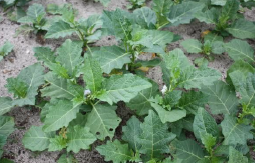Nutritional values and antioxidant activity of some reintroduced underutilized vegetables in Nigeria
Keywords:
underutilized vegetables, amino acid, antioxidant, minerals, phytonutrientAbstract
The study evaluated the nutritional values of eight newly reintroduced vegetables indigenous to Nigerian. The vegetables were analyzed for proximate composition using AOAC methods while minerals and amino acid profile were analyzed using Atomic Absorption Spectrophotometer and amino acid analyzer, respectively. Phytate, tannins and antioxidant activities were measured by Spectrophotometric methods. The results showed that dry matter, ash content, crude fiber, ether extract and crude protein (dry weight basis) ranged from 5.0 to 65.9 %, 6.0 to 16.8 %, 5.0 to 14.6 %. 1.6 to 6.8 % and 10.0 to 15.7 %, respectively. The content of minerals (mg/kg) indicated that iron varied from 6.2 and 100, zinc (0.13 and 4.6), copper (0.03 and 2.07), calcium (24 to 810) and magnesium (34 and 233), whereas chromium, nickel and lead were below lethal level. Aspartic acid and glutamic acid were the most abundant amino acids, the total amino acids (ΣTAA) ranged from 64.6 to 103g/100 g protein out of which between 44 and 49.6% were essential amino acids. Tannin ranged from 1.0 to 33.4 mg/g catechin equivalent, phytate (1.56 to 9.5mg /g), total phenol (0.53 to 0.8 mg/g gallic acid equivalent and the percentage radical scavenging antioxidant activity ranged from 69.5 to 90.3 %. The study showed that the vegetables possess high antioxidant activities and sufficient nutrients that could meet the recommended dietary intakes. Hence, consumption of these reintroduced vegetables could help ameliorate nutrient deficiencies and solve food security challenges among Nigerians.

Downloads
Published
Issue
Section
License
Copyright (c) 2021 The Journal of Applied Science

This work is licensed under a Creative Commons Attribution-NonCommercial-NoDerivatives 4.0 International License.

